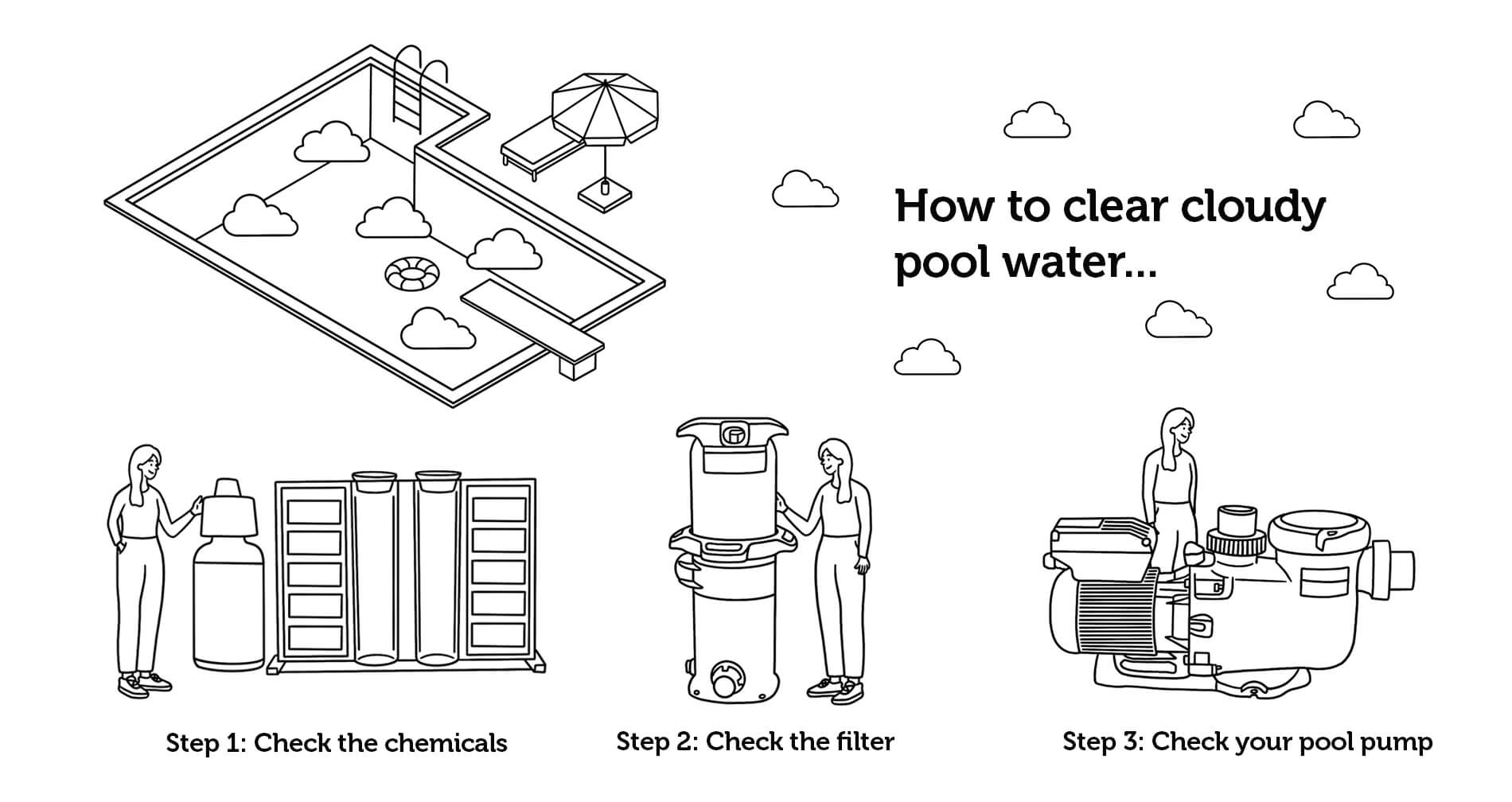
- Categories: Pool Cleaning
How to fix cloudy pool water
As a pool owner, there may come a time when you have to deal with cloudy, murky, or milky-looking water.
This usually happens as a result of an incorrect pH, clogged filters, algae, or dirt.
If you don’t want to miss out on a good dose of fun, keep reading and discover the causes of cloudy water and how to fix it!
In order to fix cloudy pool water, you will learn:
Why is my pool cloudy?
Understanding what’s causing your cloudy pool water is the first step in addressing and preventing it from happening again.
The primary causes of cloudy water include unbalanced chemical levels, inadequate filter maintenance, external contaminants such as leaves, dirt, and debris, algae growth, and issues with the pump.
Our guide will give you effective solutions for clearing up that murky mess.
How to clear cloudy pool water
We have broken down the cleaning process into three simple steps you can follow. Let’s take a look at them.
Step 1: check the chemicals
You should test the level of chemicals in your pool at least once a week to ensure that they remain consistent and provide adequate protection.
The chlorine level should be maintained at 2-3 ppm. If it drops too low, it can promote the growth of bacteria and algae. If you find this to be the problem, simply adding chlorine (either in tablet or liquid form), should do the trick.
What if the water is still cloudy after adding chlorine?
Monitor your pH levels, which should ideally be between 7.2 and 7.6. You can use pool pH test kits to check the pH level.
pH is critical to a healthy operating pool. If your pH is too high, metals can start to fall out of solution causing a cloudy effect. In really bad situations, metals can plate out on the pool surface (calcium is a metal). If your pH is too low, it will result in more chlorine consumption.
If the pH is too high, try using Focus Dry Acid or similar products to bring the water back to an optimal balance. These solutions work well, even for high levels of alkalinity. High alkalinity will hold the pH high, which can cause water cloudiness.
Calcium hardness also plays a crucial role and can be corrected with the use of products like Focus Cal Plus Calcium Chloride.
But what if your pool is cloudy but the chemical levels are fine? In that case, you might need to look at the filter or pump…
Step 2: check the filter
Cloudy water often results from filters needing maintenance.
If you’re using a cartridge filter, check the pressure gauge, remove the cartridge, and thoroughly clean it. After cleaning the filter, the water should become clear once again.
But keep in mind that cartridge filters should be replaced approximately every 2 years, so if it’s getting old, it might be time for a new one.
If you have a media filter, check that no more than two weeks have passed since the last backwash. If it has, make sure to backwash it for at least two minutes.
If the water doesn’t clear up after backwashing, it may be time to replace the media or the filter (on average, these filters can last up to 7 years). Glass media is a long-lasting, great addition to any media filter as it has a much longer lifespan than sand and backwashes far more effectively.
Step 3: check your pool pump
If you’ve tried fixing your pool chemicals, you’ve cleaned or replaced the filters, and your water is still cloudy, there might be a problem with the pump.
First, ensure that the pump you’re using is the correct size for your filter and pool. Your pump and filter need to match each other, as there is no point in having an oversized pump pushing water through a small filter.
It creates unnecessary pressure and wear. To filter correctly, you need to slow the flow of water through the filter so that it has the highest chance of filtering out the greeblies.
The objective is to run the entire volume of your pool through the filter in 6-8 hours (If you’d like tailored advice related to your pool, you can find a list of trusted stores throughout the country).
Or if your pool pump is more than 10 years old, it might be time to look at replacing it. For more information about getting your pool pump working properly, check out our dedicated troubleshooting guide.
Prevention is the best solution to cloudy pool water
Whilst we hope that you found this guide useful, the best way to prevent your water from going cloudy is regular maintenance. For more valuable insights, check out our ultimate guide to cleaning your pool.
And if you need more quality pool chemicals, you can find a local supplier in your area using our dealer directory.
Tag

Hey! I'm Adrian, founder and pool expert here at Dolphin Pacific. I love spending time with family, fishing, and have been known to brew my own beer.


